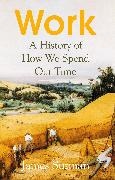Read more
Zusatztext Here is one of those few books that will turn your customary ways of thinking upside down. An incisive and original new history that invites us to rethink our relationship with work - and to reimagine what it means to be human in an ever-more automated future Informationen zum Autor James Suzman is an anthropologist specialising in the Khoisan peoples of southern Africa. A recipient of the Smuts Commonwealth Fellowship in African Studies at Cambridge University, he is now the director of Anthropos Ltd, a think tank that applies anthropological methods to solving contemporary social and economic problems. He has written for publications including the New York Times , the Observer , the Guardian , the New Statesman and the Independent, and has advised organisations including the Foreign Office, the World Bank and the European Commission. He lives in Cambridge. Klappentext _______________ 'A fascinating exploration that challenges our basic assumptions of what work means' - Yuval Noah Harari 'There is eminently underlinable stuff on most pages ... Fascinating' - The Times 'One of those few books that will turn your customary ways of thinking upside down' - Susan Cain 'Illuminating' - New Statesman _______________ A revolutionary new history of humankind through the prism of work, from the origins of life on Earth to our ever more automated present The work we do brings us meaning, moulds our values, determines our social status and dictates how we spend most of our time. But this wasn't always the case: for 95% of our species' history, work held a radically different importance.How, then, did work become the central organisational principle of our societies? How did it transform our bodies, our environments, our views on equality and our sense of time? And why, in a time of material abundance, are we working more than ever before? Vorwort A revolutionary new history of humankind through the prism of work, from the origins of life on Earth to our ever-more automated present Zusammenfassung _______________ 'A fascinating exploration that challenges our basic assumptions of what work means' - Yuval Noah Harari 'There is eminently underlinable stuff on most pages ... Fascinating' - The Times 'One of those few books that will turn your customary ways of thinking upside down' - Susan Cain 'Illuminating' - New Statesman _______________ A revolutionary new history of humankind through the prism of work, from the origins of life on Earth to our ever more automated present The work we do brings us meaning, moulds our values, determines our social status and dictates how we spend most of our time. But this wasn't always the case: for 95% of our species' history, work held a radically different importance.How, then, did work become the central organisational principle of our societies? How did it transform our bodies, our environments, our views on equality and our sense of time? And why, in a time of material abundance, are we working more than ever before?...

